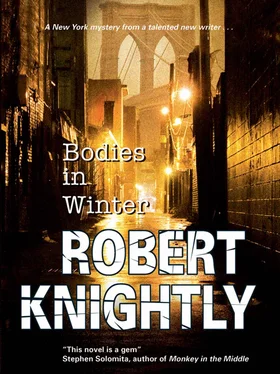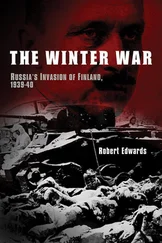Robert Knightly - Bodies in Winter
Здесь есть возможность читать онлайн «Robert Knightly - Bodies in Winter» весь текст электронной книги совершенно бесплатно (целиком полную версию без сокращений). В некоторых случаях можно слушать аудио, скачать через торрент в формате fb2 и присутствует краткое содержание. Жанр: Полицейский детектив, на английском языке. Описание произведения, (предисловие) а так же отзывы посетителей доступны на портале библиотеки ЛибКат.
- Название:Bodies in Winter
- Автор:
- Жанр:
- Год:неизвестен
- ISBN:нет данных
- Рейтинг книги:4 / 5. Голосов: 1
-
Избранное:Добавить в избранное
- Отзывы:
-
Ваша оценка:
- 80
- 1
- 2
- 3
- 4
- 5
Bodies in Winter: краткое содержание, описание и аннотация
Предлагаем к чтению аннотацию, описание, краткое содержание или предисловие (зависит от того, что написал сам автор книги «Bodies in Winter»). Если вы не нашли необходимую информацию о книге — напишите в комментариях, мы постараемся отыскать её.
Bodies in Winter — читать онлайн бесплатно полную книгу (весь текст) целиком
Ниже представлен текст книги, разбитый по страницам. Система сохранения места последней прочитанной страницы, позволяет с удобством читать онлайн бесплатно книгу «Bodies in Winter», без необходимости каждый раз заново искать на чём Вы остановились. Поставьте закладку, и сможете в любой момент перейти на страницу, на которой закончили чтение.
Интервал:
Закладка:
That brought a true smile and the merest of nods. They’d given her some sort of pain killer, undoubtedly an opiate, which was doing its work quite nicely. Never-Never Land, here we come.
But Adele surprised me. In a series of excruciatingly slow movements, she worked her way to the edge of the bed and opened the drawer of a little nightstand, extracting a key ring which she handed over. As she would have needed her keys to get through the back door of her building and into her apartment, she’d probably been holding them when she was attacked.
I slid the keys into my pocket, then looked into Adele’s eyes. Her lids were no more than a few millimeters apart, but her eyes glowed nonetheless, whether from the dope or the pleasure of seeing me, I couldn’t know. After a moment, her lips began to move, her mouth to open as she attempted to speak.
She took a long time about it, working her swollen tongue behind her teeth as she struggled with the mechanics. When her words finally broke free, they were thick and rounded, the hard consonants slurred. Nevertheless, I understood her well enough.
‘Why did you come back?’
‘Why do you need to know?’
Always respond to a question with a question, a rule of thumb familiar to police interrogators and mental therapists alike. But it wasn’t going to work here. Adele continued to stare at me, a bug-eyed lizard fixed on a crawling insect. I could answer, or I could be eaten. It was strictly up to me.
‘You’re my partner,’ I finally said, ‘and I have to defend you to the death or suffer eternal damnation. Call it cop culture, the mythology of the job, whatever. You don’t leave your partner’s back undefended, no exceptions.’ I shifted my weight on the bed, but maintained eye contact until I was sure Adele wasn’t going to be the first to speak. ‘Only there’s much more to it, which you already know.’
‘Like what?’
‘Like bodies in winter, like David Lodge’s body on a lawn in the middle of January. That brown grass, it looks nice and soft, but when you kneel down, it’s all frozen little knobs that get up between the bones of your knees. And then there’s the blood. Blood that fresh isn’t supposed to be hard, just like the sun isn’t supposed to be cold. You remember the sun that day, Adele, how bright it was, how cold it was? I felt like I was sucking that icy wind down into my bones.’
That was it for me, as far as I wanted to go, and I lapsed into silence. A few minutes later, Adele pushed a red button attached to the sheet, releasing a jolt of whatever pain killer she was taking, then drifted off to sleep. I remained where I was for a short time longer, listening to the pulse of her IV pump as it forced a mix of antibiotics and saline into her veins. I knew there was work to be done, that the night would be long, that the faster I moved the better off I’d be. But I kept imagining the pain, not only from the blunt object that had crashed into Adele’s face, but from the surgeries to come. I’d seen injuries like hers many times and I knew she’d never look the same. Without doubt, she knew it as well.
I finally took my weapon from its holster, slid it into the pocket of my coat and left. A nurse pushing a medication cart looked up as I came down the hallway, a pretty woman in a starched uniform. I returned her smile without hesitation. The way I saw it, I had only one problem. When my Nissan fired right up a few minutes later, I had none.
I found three sets of files and a notebook, all neatly arranged on Adele’s dining-room table. Though I might have hung around long enough to study them at my leisure, I packed them into a briefcase and went out through the rear of the building, avoiding the doorman. It was now approaching eleven o’clock and I wanted to settle down with a pot of coffee in my own apartment as soon as possible. Still, I made a stop on the way, driving to Woodward Avenue where it passes behind Linden Hill Cemetery, to the edge of the ridge that gives Ridgewood its name. The cemetery was by far the largest green space in the neighborhood.
I pulled the car to a stop along the curb, shut off the headlights and threw the transmission into PARK. Initially, I made no effort to organize my thoughts, content to stare out over a pair of auto Graveyards at a sliver of the Manhattan skyline nine miles away. The Chrysler Building was clearly visible, and the Met Life Building, somehow squat for all its two and a half million square feet. There were a dozen others, as well, that I didn’t recognize, a four- or five-block swathe advancing from west to east.
Little by little, my thoughts slowed down, until I was left with the game I’d chosen to play, and with the stakes on the table. Adele had been viciously attacked and the most obvious suspects were Lodge’s killers. But it didn’t have to be that way. Chris Tucker’s outrage, when I confronted him in Sparkle’s, had been hot enough to singe the hairs in my nostrils. That he, or someone very much like him, had decided to teach Adele a lesson was entirely possible. And then there were the bosses. Sarney’s call had come only a couple of hours after the attack on Adele. Had Sarney known about Adele when he called me? Had there been a hidden message in what he’d said?
I watched a police cruiser slowly climb the hill. It pulled to a stop alongside my car and the officer behind the wheel shone his six-battery flashlight into my face.
‘Hey, Harry, what’re you doing here? It’s Paul Aveda.’ Aveda turned the flashlight on himself, as if his word alone wasn’t good enough.
‘Sittin’ and thinkin’,’ I responded.
‘You don’t need a lift home, do ya?’
‘Paul, if I’ve ever had a more sober moment in my life, I can’t remember it.’
‘Ten-four, detective.’
Aveda’s tail lights were still visible in the rear-view mirror when my cell phone began to ring. My first thought was of Adele, but that was wishful thinking. The vaguely female voice on the other end of the line had been generated by a computer. That was evident in the odd cadence and the staccato delivery.
Sza-rek. Russ-o. Jara. Zel. Sky. Put their pieces to-ge-ther. It won’t be that hard, if you have the balls.
The phone went dead at that point and I returned it to my pocket. Up ahead, framed by trees on either side of the road, the view was sliced by a set of telephone wires that crossed Woodward Avenue a hundred yards from where I sat. Adele and I often came here when the weather was good, to sit with the windows open, to eat a take-out lunch, to stare at Manhattan as if it was a fable passed down from one generation to the next. This was especially true on summer days when the towers shimmered in the distance like the after-image of a receding dream.
But on that Saturday night, with the temperature in the mid-twenties and the wind crisp enough to blow New York’s soot into the Atlantic, it was more like staring through a jeweler’s window. The triangular lights on the Chrysler Building seemed ready to leap beyond its spire and the windows in the glass towers, lit only by the moon, were sharp enough to count.
TWENTY-THREE
The Brooklyn neighborhood of Greenpoint is similar to the neighborhoods of Ridgewood and Bushwick in many ways. Established in the middle of the nineteenth century, Greenpoint, too, was created to serve the needs of manufacturers fleeing overcrowded Manhattan. The Civil War ironclad, Monitor, was built in Greenpoint, at the Continental Iron Works, and one of the first kerosene refineries in New York, Astral Oil, opened for business in 1867.
Both Continental Iron Works and Astral Oil were long gone by the time I drove into Greenpoint on that Sunday morning, replaced, along with most of the community’s manufacturing base, by warehouses offering service-sector jobs at appropriately lower wages. But Greenpoint was still vibrant, having undergone several major population shifts in the past fifty years. The first had begun after WWII, when a half-million Puerto Ricans poured into Manhattan’s two great barrios, East Harlem and the Lower East Side. By the early Sixties, the barrios were full and the Puerto Ricans began to move to neighborhoods in the outer boroughs. One of those neighborhoods was Greenpoint, where they came to dominate a section on the community’s northeastern edge.
Читать дальшеИнтервал:
Закладка:
Похожие книги на «Bodies in Winter»
Представляем Вашему вниманию похожие книги на «Bodies in Winter» списком для выбора. Мы отобрали схожую по названию и смыслу литературу в надежде предоставить читателям больше вариантов отыскать новые, интересные, ещё непрочитанные произведения.
Обсуждение, отзывы о книге «Bodies in Winter» и просто собственные мнения читателей. Оставьте ваши комментарии, напишите, что Вы думаете о произведении, его смысле или главных героях. Укажите что конкретно понравилось, а что нет, и почему Вы так считаете.












